#no one else can see the inherent tragedy in this?
Explore tagged Tumblr posts
Text
Crazy wild shit man
#how are we straight up accepting the emmrich romance lich choice for how it’s written#does anyone feel me#hello???#no one else can see the inherent tragedy in this?#maybe I’m too mort ass pilled but um. trading away your life to escape death is no life at all#and why can’t rook be like. you killed yourself and took yourself away from me and now you have no skin for me to caress and no warmth for#me to share and though it’s still your consciousness you’ve a) gained a perspective I can never ever share and b) you have accepted#outliving me so thoroughly that I will be just a drop in the bucket of your life even if I get another good 50 years out of life.#why can’t I ask him is all this worth it without your heart????!??#why can’t I break it off?!!!???#why do I HAVE to celebrate this choice#emmrich volkarin#dav spoilers#and that’s not even getting into the philosophical questions surrounding fear and what it means to live like.#emmrich… has ocd. and I have no doubt that those fears are truly debilitating (despite this almost never coming up in the narrative)#and essentially this choice is one about how to deal with it. acceptance vs avoidance. and we see no consequences for either!!!#if he chooses to accept this fear as a part of him and work through it WE SHOULD SEE THAT WORK#he should struggle!! and that struggle should lead him towards making peace with that fear#AND!!#if he chooses to escape from that fear— to actively avoid ever resolving it— we should see him struggle with that too!!!!#molding your entire existence around this fear to the point you embody it… where are the emotional consequences for that!?#WHY DO I— AS SOMEONE WHO SUPPOSEDLY LOVES HIM— NOT GET ANY OPPORTUNITY TO PUSH BACK OR ASK SOME TOUGH QUESTIONS?!?#in a game about the tyranny of immortality… we can send our beloved to kill his mortal self to come back as an immortal husk.#and we’re not even allowed to be sad abt it the very next scene is some goofy cartoon shit at the lighthouse where every single person just#immediately accepts this reality and has no issues. not even taash 😭
41 notes
·
View notes
Text
i am once again astounded at the bsd fandom's ability to make everything about skk when, in fact, it has very little to do with skk
#this is about beast.#like okay i see the allure of beast!skk but seriously??? it's way overhyped#you just want to make everything about the only two characters you can bring yourself to care about when it is#NOT ABOUT THEM#BEAST ISN'T ABOUT SKK. BEAST IS BARELY EVEN ABOUT SSKK.#BEAST IS ABOUT THE INHERENT TRAGEDY OF HAVING A SIBLING AND WHAT DESTRUCTION THAT CAN CAUSE#beast is about what core characteristics of a person remain the same in every universe#and what is changed based on environment and circumstance#beast is about the unimaginable power and danger of platonic love#beast is about showing how the people around you help you grow - for better or for worse - and changing even just one person#in your constant vicinity can have rippling effects on the person you become in their absence. or in the presence of someone else.#beastskk is going to go straight to the top of my hate list THIS AIN'T ABOUT THEM!!!! THIS IS ABOUT LITERALLY EVERYONE ELSE#ahem. anyway#i'm gonna get cancelled over this just wait#grace reads bsd
51 notes
·
View notes
Text
shonda rhimes save me..... shonda rhimes...... save me shonda rhimes!!!
#ok brimsley narration you have charmed meeeeee happy pride month <3#it's not as good as the scene in the show. i loveeee that first brimsley and reynolds scene in the show#not because they're having gay sex although i think it's awesome that shonda put gay sex in bridgerton#i love the way those guys fucking talk to each other.... genuinely one of the top parts of queen charlotte is the way charlotte and george#communicate through brimsley and reynolds be it knowlingly or unknowingly#they're like charlotte and george's parallels and mirrors it's so awesomeeeeee oh my god#also the inherent tragedy of loving someone who has already devoted their existence to someone else...#and someone else who can't love them back too.... and your only hope to be loved back is with a person in the same situation as you#but then of course. you can never really have each other because you're already not the most important person in their life#i wonder if there ever could have been a time where reynolds might have wanted to give up his devotion to george to be with brimsley#which would have been tragic because brimsley would NEVER give up charlotte. and it's sooo delicious!#anyway i love the way they talk when they're arguing about charlotte and george....#literally shonda you are the genius of our generation!!!!!!!!!!!!!#i'm choosing to imagine all the things wrong with this book are julia quinn's fault seeing as my queen would never betray me#(ignoring all the betrayals)
4 notes
·
View notes
Text
Domestic Arkham!Jason Todd Headcanons

Y’all ever think about the inherent tragedy of Arkham!Jason craving something as simple as domesticity?
How he craves the comfort of home-cooked meals, but can’t actually eat anything he hasn’t prepared himself. Because during his time in Joker’s captivity, almost everything he was served was either poisoned or rotten, and now every time he eats, it’s like he’s expecting the burn of poison or the flavor of something sour and rotten flooding his mouth.
Can you imagine the frustration he must feel at his inability to share a simple meal with you?
The sudden clench in his gut when he realizes that he wasn’t there to watch you prepare the food, and despite the fact that he trusts you, he can’t help that familiar dread rising in the back of his throat.
Jason tries, for you, he tries.
But there are times, more often than not, when he feels the phantom burn of poison or the flavor of something sour and rotten flooding his mouth–and his body reacts before his mind does.
And suddenly he’s hunched over the sink or the toilet, vomiting out half-digested food, and it’s almost like he never left Arkham Asylum.
Can you imagine the absolute burning jealousy he feels whenever his family interacts with you with an ease he can only dream of?
Maybe it’s a movie night, during one of those rare times when Gotham City didn’t need saving, and there’s Tim and Dick and Barbara piled on the couch. And you fit so well with them–a tangle of limbs and careless laughter at a dumb joke Dick made–that it’s Jason who feels like an outsider.
Jason sits apart from all of you, the only person to pick an armchair instead of the couch, because every time he tries to sit close to someone, all he can think is whether they’re close enough to see his scars.
The table is piled high with snacks, more than the five of you can realistically eat in an evening. There’s popcorn and pizza, mozzarella sticks and pretzels, several bars of chocolate that can only be found in Bludhaven, the air is thick with the smell of grease and cheese dust.
And it’s almost like being a teenager again. Before that night and the Joker and everything else that followed.
It’s almost like being a teenager again, dizzy with the good fortune of being adopted by Bruce fucking Wayne, watching some dumb flick with his siblings when he was supposed to be training. Ordering takeout food and laughing along with Dick at Alfred’s visible disappointment as they stuff their faces.
It’s almost like being a teenager again, but not quite.
Jason watches the four of you pass around a bowl of popcorn, arguing about which genre of movie to start with. But when Barbara tries to hand it to him, he feels a sudden clot of heat in his chest, and he’s already shaking his head before he even knows why.
And he realizes, he’s afraid.
He doesn’t know who made the food or what restaurant it was ordered from, and he is sure if he asks, no one would be able to give him all of the names of people who handled it.
The burn of poison and the taste of something sour and rotten flooding his mouth.
Poisoned cake and rotting rats. The writhing of pale white maggots against bone and glistening meat and gristle.
He doesn’t touch anything for the rest of the evening.
Can you imagine how scared he is?
Jason is so acutely, painfully aware of how exhausting it is to be with him. To be with someone you can’t even share a simple meal with.
And he wonders how long it will be before you get tired of him.
Bruce, after all, had left after he had seen the twisted thing Jason had become.
And if his own father couldn’t even stomach his presence–
And suddenly he’s hunched over again, over the sink or against the toilet, vomiting out half-digested food.
And it really is like he never left Arkham Asylum after all.
This is what he thinks, when he finally collapses on the tiles of your bathroom floor, cold sweat pouring down his face. Your presence hovering over him like a ghost, a thousand apologies pouring from your throat.
But it’s not you that’s the problem, it’s him.
It’s this awful thing in the back of his head, always expecting the next threat, the next injury, the next sick game the Joker has come up with.
It’s the fact that his days with the Joker had left him so twisted and strange that he can no longer fit into a normal life, even when he wants to.
And this is what he thinks, when you catch the way he is not watching the movie at all. But instead he is looking at his family’s faces, his chest pulsing with a jealousy so fierce it might as well have been his heartbeat.
Jason wishes–oh, how he wishes–it was that easy, that simple for him.
You disentangle yourself from his siblings–Dick had already fallen asleep, head lolling heavily on your shoulder, to pad your way to him. You sink down onto the armchair to share it with him, practically on top of him, and he marvels at the way your heat dispels the chill that has crept over him.
Your hands are small compared to his, but they are just big enough that when you lay them atop of his, he does not have to think about whether you can see the scars.
This is what he thinks, on days like these. It is something he always thinks, a small voice in the back of his head that is never silenced.
He doesn't deserve you.
------------------------------------------------------------------------------
Thanks to @red--pirate for the idea!
#jason todd x reader#red hood x reader#arkham knight x reader#it's all right jason i've been eating the scented candles when no one is looking we're all a little weird#alexa play “my love is sick”#tw ptsd#tw poisoning#tw trauma#tw internalized victim blaming
1K notes
·
View notes
Text
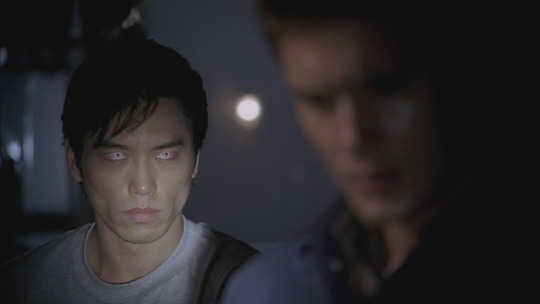
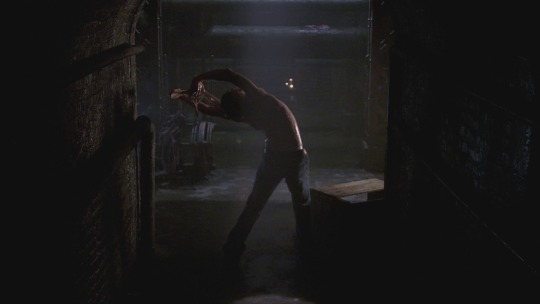
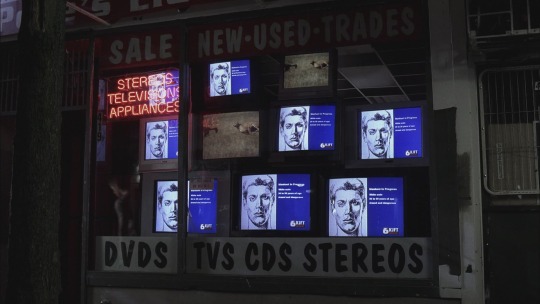
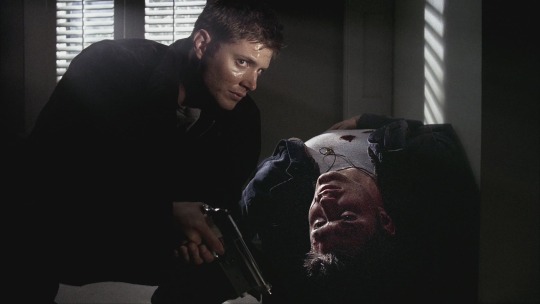
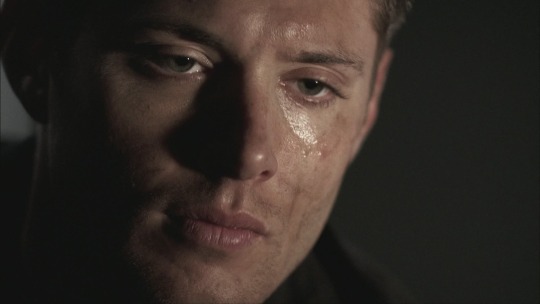
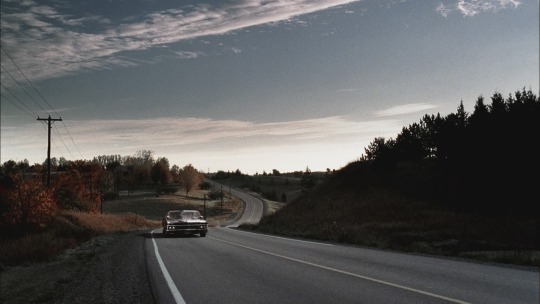
Favorite Shots Per Episode ✩ 1.06 Skin (3/3)
cinematography analysis and queer reading under the cut
It's of course very obvious that the shapeshifter is functioning as a mirror to Dean, but I still find it fascinating how this is depicted in the cinematography. Because the director isn't using physical mirrors, despite them being such a popular trope in horror for showing the true self or the mental state or metamorphosis of a character. The only time where you sort of see one is in a foreshadowing shortly after the establishing shot with the side-view mirror (which I absolutely love):
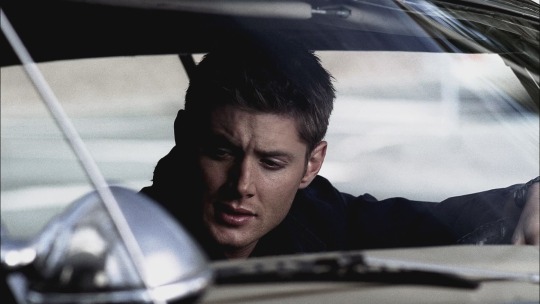
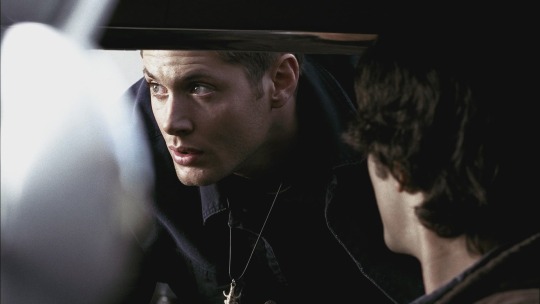
But for the rest? Not really. I always wonder if interpret waaaay too much into certain frames, but I am kind of obsessed with how Dean and Becky are divided by the crime scene tape in this shot. Becky is the victim. Dean, well Dean? He's the monster. Kind of. I think a lot of the reflection in this episode happens through what Dean is not also, and he's are not living the lives of 'normal' people. I love how the directing of the episode shows early on that Dean does not belong to that part of society, just like the shapeshifter.
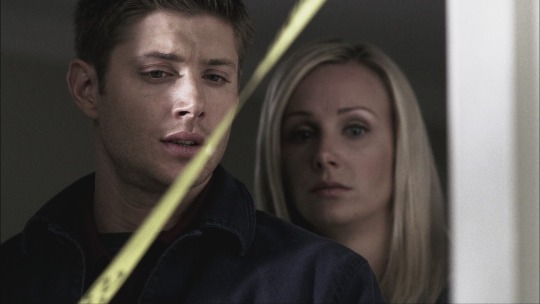
I mean I obviously am doing a queer reading of that (being queer myself), with the monstrous and othered bodies in media being those that are not conforming to various aspects of white cishet society. But I am going to say - the implication that there is a sort of inherent tragedy to Dean's life, not just a sense of not belonging because of his 'lifestyle' but also the fear of being monstrous enough to destroy other people's bodies and livelihoods? Ugh. It hurts, and it's sadly coming back in anti-queer narratives to this day. But yeah, as I said, Dean is portrayed in a way that is disconnecting him from the rest - also from Sam who is the link to this 'normal' life by knowing Becky and who has kept Dean from 'being himself' by pursuing his own dreams and conforming to the exact society that Dean is not belonging to, letting Dean behind in a position where he's neither free to be himself nor enough to be someone else -, and that is giving him a sameness to the shapeshifter.
Dean has to hide the queer part of himself, in a desperate attempt to be accepted, mirrored by the monster of the week: "So maybe this thing was born human but was different, hideous and hated...until he learned to become someone else."
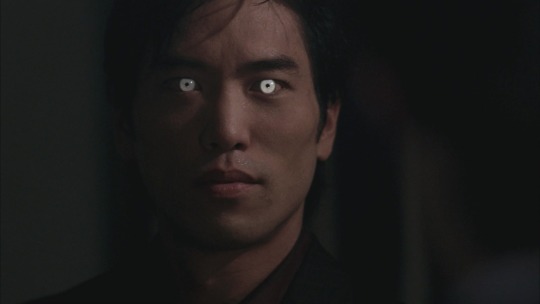
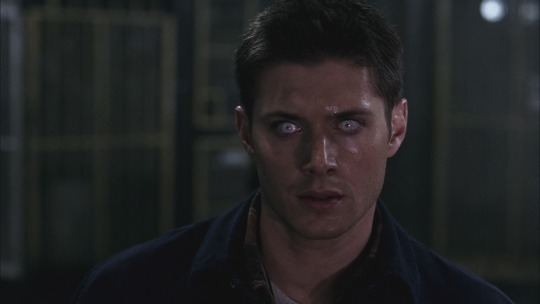
I think that's why I am also obsessed with these shots. Because both the shapeshifter and the shapeshifter as Dean are getting one, revealing their true self underneath the mask that is this body, a body that is subjected to other people's ideas and is projected on and isn't their own. But also the eyes are mirrors? The body part described as the 'mirror to the soul'. It's a little cliché and on the nose, but I find it way cooler than just working with physical mirrors, you know?
And yeah, when it comes to reflections, of course, we cannot forget this scene:
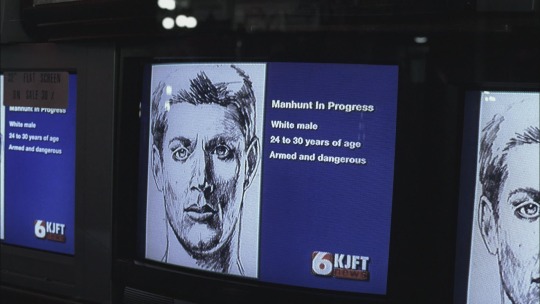
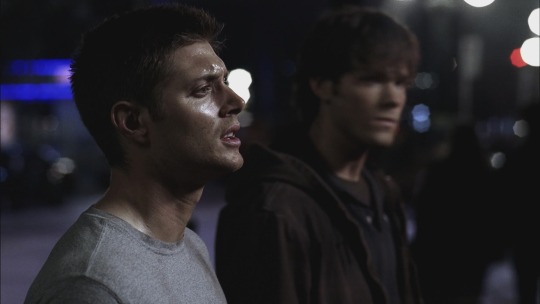
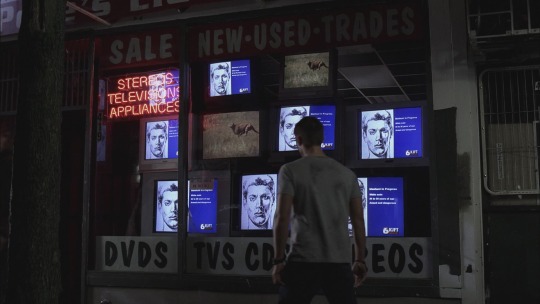
Which is Dean seeing himself, but more so is actually Dean seeing how he is perceived by others. It's not a depiction of his actual self, it's a depiction of the concept of him. We know this, we know Dean is not the 'bad guy' that is televised nor is it an accurate portrayal of him. But I think that it serves to show the audience how media is a place that can shape ideas and construct norms, and it also serves as a way to remind Dean that this is how he will be reacted to if he dares to 'become' monstrous. If he dared to be like the shapeshifter, the outcast, and put his own being over his responsibility to conform. Despite his brother Sam being allowed the same egoism - but Sam's egoism is striving to conform, he's [email protected] you know, and Dean's egoism is striving to be free, to regain control over his body.
And then we have this shot.

Followed by this shot.

Dean 'killing' this reflection of himself, this part of himself in favor of serving and saving. He's a freak, but he's not just a freak like Sam in that he's currently living the hunter lifestyle and didn't really fit into Stanford. Because - well, he's different than Sam. Queer. He's isolated, alone, born hated like the shapeshifter if he ever lived his true self, yearning to be loved. The shapeshifter literally says it: "All he wants is for someone to love him. He’s like me. You know, everybody needs a little human touch now and then. It’s so hard to be different." I think this episode hits so hard for me because you can see Dean's self-hatred, especially in that last shot, Dean's internal struggles that he hides so well under his hero-esque facade. But also how he is ultimately a loving and caring person, putting everyone's happiness above himself.
I think despite this episode reading like being queer is an inherent tragedy at first glance, it walks a fine line in actually trying to convey quite the opposite. Dean is other, but the other isn't bad. Yes, he does good by suppressing himself, so does that mean he has to act according to others to be happy? I don't think that is what the episode is saying. I think it is more an example of Dean's 'monstrosity' being not the same as the shapeshifter's monstrosity in the end, that despite all the sameness they aren't one. That despite what society depicts him to be, evil and harmful to others, he isn't this mirror image projected onto him. He isn't what was shown on those televisions, or in a wider sense, the media. He isn't what is hunted down by the SWAT team, or in a wider sense, institutions in power. Dean's self IS good. Dean's self IS caring and loving, despite his fear to pursue his own dreams and be free, and it's not coming through his actions of suppressing those desires, but because he ultimately is neither those 'normal' people nor the shapeshifter, but his own truth. So yeah, while I think this episode definitely walks a dangerous path by having Dean continue to live this old life in the end, the cinematography in this episode also functions to reveal how - while horror is a love letter to the monstrous, represents counter-narratives and helps to deconstruct normativity (like in this episode!) - the monstrous is often instrumentalized to suppress and oppress and depict victims as an inherent danger to the established systems of oppression. Dean's true self isn't bad. People are just made to believe that it is.
#spn#supernatural#spn 1x06#dean winchester#spn screencaps#spn meta#spn screenshots#spn 1.06#skin#spn skin#dean#screencaps#screenshots#stills#val's favorite shots#meta
235 notes
·
View notes
Text
Sadly, the Wuthering Heights furor has also led to people (many of whom, let us be real, simply dislike the book or otherwise only think of it when it's brought up) to discourse about the content of the novel versus the wrongness of Emerald Fennell's choices with regards to the movie, which of course, has opened up the classic "IT'S NOT A ROMANCE! IT'S NOT A LOVE STORY! BAD PEOPLE! HATE STORY!"
... Which is... also a bad take.
First off, to be very clear, "Romance" is not inherently "genre romance", which is the thing I blog a lot about that was solidified in the latter half of the twentieth century (and which, no doubt, was influenced on some level by WH as much as Jane Eyre, Austen novels and so on). Wuthering Heights is a romance, it's just not a genre romance/romance novel. And indisputably, Wuthering Heights is a love story.
It may not be a love story you like. It may not be a love story with a happily ever after (though I will say—this is one of the few books where I think it's pretty debatable, as "wandering the moors as ghosts", if that is what happened, is kind of... what Cathy and Heathcliff would've wanted... and their ultimate desire was to be TOGETHER, regardless of whether or not it damned them, so is it an HEA in their freaky minds? Maybe so lol). It may ALSO be an abuse story in which the lovers act horribly to each other.... though, I gotta say, MUCH WORSE to literally everyone else in their lives than they do to each other...
But it's a love story. That is one of several things it happens to be. The entire novel is driven by this central love story between Heathcliff and Cathy—a love that is, contrary to what a surface-level reading or reading by word of mouth would imply... very much mutual. I've already gone on about how Cathy Earnshaw is not Heathcliff's victim the way Isabella Linton is, and how Cathy is very much as involved in the love affair as he is. But truly, while their individual internal struggles are the framework and what keeps them apart in many ways—Heathcliff being a man of color and subject to racist abuse, Cathy conforming to society and classist pressures when her natural temperament is very much not of society—what propels the story is this romance.
Because they are supposed to be read as extremely similar, and as two people who do not truly identify with anyone but one another. They're supposed to be read as like minds. They're supposed to be read as thwarted. Some of the things those two say about each other and to each other are legitimately some of the most romantic lines I've ever read.
I mean, are they also kind of sick and wrong? Sure! But I do find it kind of rich to see people who are totally fine with reading dark romance wring their hands over the public at large interpreting Heathcliff and Cathy's relationship as an epic romance. I don't have an issue with anyone enjoying either! But. Let us be real. Part of why y'all are even enjoying work like that is the standard that books like WH set, and the fact that WH does speak to the lure of the dark and the tragedy of people who are super imperfect... and also super in love... continuously fucking up their own lives (and the lives of basically everyone around them) in this push-pull of denial and desire.
When people say "HOW COULD ANYONE EVER INTERPRET THIS AS ROMANTIC?" I just have to question... did you read the book? Because even if it's not for YOU, if it's not romantic TO YOU, surely you can see why other people (me and mine lol) read lines like these and go, "Wow, romantic":
“Catherine Earnshaw, may you not rest as long as I am living. You said I killed you--haunt me then. The murdered do haunt their murderers. I believe--I know that ghosts have wandered the earth. Be with me always--take any form--drive me mad. Only do not leave me in this abyss, where I cannot find you! Oh, God! It is unutterable! I cannot live without my life! I cannot live without my soul!”
(fun fact: I do have a part of the above quote tattooed on my body and I'm very happy about it)
"My great miseries in this world have been Heathcliff's miseries, and I watched and felt each from the beginning: my great thought in living is himself. If all else perished, and he remained, I should still continue to be; and if all else remained, and he were annihilated, the universe would turn to a mighty stranger: I should not seem a part of it."
"Hush, my darling! Hush, hush, Catherine! I'll stay. If he shot me so, I'd expire with a blessing on my lips."
[said when her damn husband is almost at the door lol]
"I’m not wishing you greater torment than I have, Heathcliff. I only wish us never to be parted: and should a word of mine distress you hereafter, think I feel the same distress underground, and for my own sake, forgive me!"
"'Heathcliff, dear! you should not be sullen now. Do come to me, Heathcliff.’
In her eagerness she rose and supported herself on the arm of the chair. At that earnest appeal he turned to her, looking absolutely desperate. His eyes, wide and wet, at last flashed fiercely on her; his breast heaved convulsively. An instant they held asunder, and then how they met I hardly saw, but Catherine made a spring, and he caught her, and they were locked in an embrace from which I thought my mistress would never be released alive..."
"Kiss me again; and don’t let me see your eyes! I forgive what you have done to me. I love my murderer—but yours! How can I?"
[Read: she is the murderer he is talking about. He's saying she doomed herself to death a long time ago, and he hates her for it. While also crying and kissing her lmao]
They're sickos! Nobody can argue otherwise. But that does not mean they're not in love, and it doesn't mean this isn't a love story, and wagging your fingers at people who read this as the obviously destructive love story this is and find it romantic... doesn't change that.
And the thing is that the book makes it pretttyyyy clear that even if Heathcliff and Cathy has assholery programed into their personalities, WITHOUT the contexts of how they were raised and the society that expects them both to conform to prescribed roles, they would probably just... be together. Like, they victimize people, especially Heathcliff. But they are also victims. The book isn't about a critique of two people Emily Bronte dreamed up; it's a critique of the CIRCUMSTANCES by way of Gothic, subversive melodrama. At the end of the day, their feelings, however passionate they are, are not inherently subversive. Their feelings are NATURAL. But they're twisted and contorted into something ugly through circumstance and the characters' responses to those circumstances.
For Heathcliff, A LOT of those circumstances that did twist him are in fact out of his control. Which is why we hate that casting, right?
But all that said, a love story being dirtybadwrong and about Bad People doesn't mean it isn't a love story, lol. Again—we don't even expect genre romance to be about good people.
Like. Yeah. We know Heathcliff and Cathy are assholes. You're not breaking new ground with that take. The book is still, in many ways, about those assholes being in love.
#wuthering heights#breaking my silence: i think wuthering heights is one of the most romantic books of all time lol#and i don't know WHY people think that imagining something is romantic implies that you want to APPLY THAT TO YOUR LIFE
210 notes
·
View notes
Text
I know people don’t love Thalia being harsher towards Annabeth in the tv show version of the story (the whole “Luke cared for me right away, but Thalia made me earn it”-thing) and I completely understand why
However. Consider the following:
Thalia looking at Annabeth and seeing the little brother she lost. Thalia keeping her distance at first because she can’t bear it. Thalia knowing above all else that this little girl needs to learn to protect herself because she knows how easy it is to lose someone who can’t.
Thalia not wanting to let herself get attached because she knows how it can hurt and getting attached anyway.
Annabeth looking at this girl who couldn’t help but love her despite actively trying not to let herself and learning that love is something to be earned.
Also something something the inherent tragedy of Luke caring about Annabeth when she felt like no one else in the world did. Of course she’d want to keep believing that he’s good. Of course she’d want to keep believing he can be saved. He was the one who cared about her when it seemed like everyone else was writing her off. Of course she’d want to do the same for him.
#Thalia Grace#grace siblings#annabeth chase#luke castellan#pjo#percy jackson#percy jackon and the olympians#jason grace#hoo#heroes of olympus#pjo tv show#pjo tv series#I apparently also don’t know their trio name that’s so embarrassing for me
194 notes
·
View notes
Text
In the modern publishing landscape, these days, I think like we do not have many (if any) point-of-view characters with low social motivation for whatever reason.
Sure, there are lots of characters with social anxiety or other perceived or legitimate foibles to overcome, there are many YA villain origin stories, and there are many unpalatable, traditionally "unlikable" men in classics, but disregarding those, who else do we have?
Can the state of openly being alone (and content) rarely be presented as morally-neutral or as the end result of a narrative? Must it always be that either being alone is the starting point, so there's room for "personal growth," or that being alone is seen as "undesirable" and/or an indication that the person alone has a "problem" or something otherwise wrong with them, like a deficit or moral failing that in some kind of karmic way gives them "what they deserve," which is being alone and discontent with it?
Characters with society anxiety, any differences in communication, or other reasons that interfere with forging connections "don't count" because they may still be motivated. Traits such as these only stand in the way of gaining relationships, as plot obstacles. They aren't intrinsically tied to indifference or to low motivation. So, these characters clearly are not experiencing a lack of interest. And they are not the ones rejecting others. Thus, they "don't count" as far as the archetype that I'm looking for goes.
Characters who undergo villain arcs or otherwise negative arcs may want to maintain their relationships or gain them, so some examples are immediately disqualified (hence not having low social motivation), even if they are the type of character most likely to alienate themselves by a story's end, conflicting with what they wanted.
(Unfortunately, Coriolanus Snow, who is quite close to the type of protagonist I'm searching for "doesn't count" because he has some drive to keep people in his life.
Rafal Mistral partially "counts," and is satisfying as a character, but also doesn't count because he temporarily makes "friends" or allies, depending on how you look at his exploits. Yet, despite all this, not having friends isn't exactly framed as a morally-neutral state either, so he is also disqualified by the end. Basically, he does have low social motivation, but his narrative lacks the conditions that would make the natural consequences of that low motivation play out for themselves. He is always surrounded by people, even if he hates every last one of them.
And, generally speaking, the usual, moody-broody, "misunderstood" YA love-interests very easily "don't count" because they have a desire to get closer to their object of affection.
Even Katniss Everdeen, an overall good person, who usually views herself as "unlikable," befriends others, originally for pragmatic, survival purposes. However, she does start with low social motivation, so that's something in her favor.
And yes, I'm aware that we need other people in this world—I would just like to see someone prove that supposed truth wrong once. And perhaps succeed in their world, if that's not too much to ask for.)
Also, are there any instances of characters who progressively alienate themselves from others, in which that progression is not inherently seen as negative? Like, what about non-corrupt misanthropes? Are there few of those in literature? (Maybe—Eleanor Oliphant from literary fiction counts, but something about that book did not appeal me and I didn't finish it.)
Classics guys sort of "count," but I haven't really seen examples of any comparable protagonists today since many authors and readers write and look for "relatability" in blank slate everyman figures oftentimes.
(I'm not done with Crime and Punishment yet, but Raskolnikov is very tentatively looking like a safe bet for a character who may end up alone and who may not be completely malcontent over such a fate, even if I'm expecting tragedy. I'm that not far along, but I also wouldn't mind it too greatly if he died, I suppose.
And even Sherlock Holmes has Watson as his constant, even if he's notoriously asocial! So he "doesn't count" either.
Carol from Main Street also comes close, but still ultimately desires approval from others.
Maybe no one is truly immune to humanity and I should give up on this notion?)
How many pov characters out there are 1) apathetic toward the masses and 2a) either alienate themselves as the plot progresses or 2b) do not make any friends? (I will allow them making friends and consequently losing them though because that still ends in net zero!)
Indeed, this "gap" in protagonists I've been running into lately, especially with coming-of-age arcs and protagonists whose arc is some form of "getting out of their shell," is: why do we (almost?) never see protagonists who just flat-out don't progress in terms of connecting with fellow humans?
Wouldn't having even a handful of those types be reflective of reality? (We as a society are more disconnected than ever, to be fair, despite constantly having access to one another via technology.)
Or I would completely understand it, if it were narratively impractical to have a plot in which a protagonist makes zero friends. Maybe, it's a near-unwritable form for a story?
So, my question is: does anyone have book recommendations, which present a character whose end goal is not to make friends or forge connections (any other ambitions or motivations are fine) and whose state of being friendless both lasts and is regarded as morally-neutral or as not outright evil? Any genre is fine. High fantasy is preferable. I am stumped.
(I also wouldn't mind recommendations of books in which the protagonist is vilified due to being alone, even if that is not my primary query here.)
#bookblr#dark academia#writing#introvert#writeblr#books#booklr#bookworm#hunger games#introversion#bookish#book#writer#writblr#creative writing#tbosas#the ballad of songbirds and snakes#coriolanus snow#the hunger games#book recommendations#books and reading#crime and punishment#raskolnikov#fandom meta#book reccs#fandom#eleanor oliphant is completely fine#school for good and evil#rafal mistral#rise of the school for good and evil
108 notes
·
View notes
Text


Propaganda
Nancy Kwan (The World of Suzy Wong, Flower Drum Song, Tamahine)—Nancy Kwan is my faaaaave like you don't understand!! watching her dance in her beautiful chic boudoir in flower drum song—the GRACE of it, the STUNNING BEAUTY. she is everything i've ever wanted to be and more. theeee most beautiful woman of the 60s i don't care what anyone else says! my queen my icon my legend!!
Rita Hayworth (Gilda, Cover Girl)—Absolutely, drop-dead gorgeous. She steals every movie she’s in; she was Fred Astaire’s favorite dance partner, as you can see in clips from their movies [link][link]. Born Margarita Carmen Cansino, Rita's story had its tragedies—her father was awful and had her performing in nightclubs way, way too young; the studio totally remade her look because they were afraid of her hispanic image, putting her through painful treatments and diets; she had a string of failed marriages. But beside all that, I think there's something about Rita that still glows through—an inner beauty that has nothing to do with the studio, or the men who pinned their dreams on her. Rita brings an incandescence to roles that's impossible to replicate, and was truly a great actress in that she could switch from herself—shy Margarita—into a bold and glamorous femme fatale so convincingly everyone fell in love with her as Gilda. She's my favorite movie star, and I think she was a beautiful human through and through—Rita, gorgeous and real and shining bright.
This is round 4 of the tournament. All other polls in this bracket can be found here. Please reblog with further support of your beloved hot sexy vintage woman.
[additional propaganda submitted under the cut.]
Nancy Kwan:
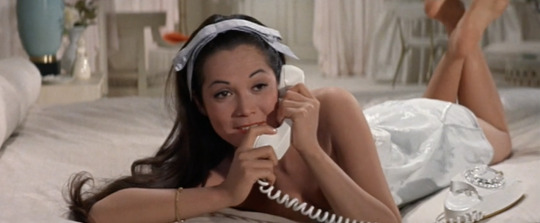
"askgdshadlg women"
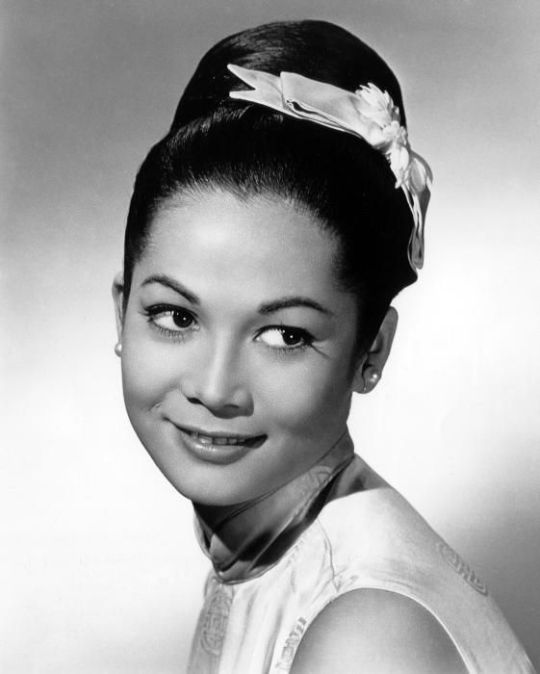
"2 Golden Globes. Was in 15 movies to 1970 and many more after."

"have you seen her? she’s beautiful and love her so much. she also did ballet before acting."

"She was one of the few Asian American starlets of her time, she is graceful beautiful and she had to work a lot at making it big under the circumstances (20th century Hollywood)"
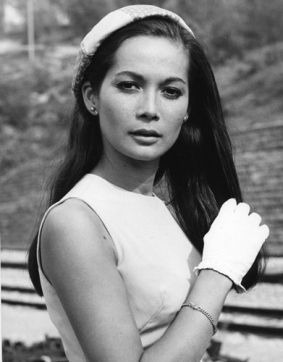
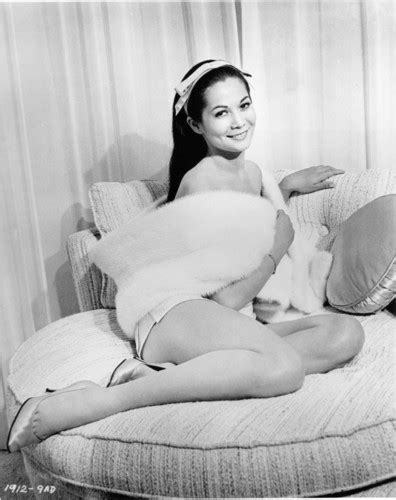
"Ok, this is super niche, but movies for Asian American girls growing up in the 80s was limited. Nancy Kwan is really freaking gorgeous and, while her character in Flower Drum Song is problematic nowadays (i heard she cried when asked to do the lingerie scenes), having an Asian American woman on screen with her own prerogative+agency was formative."

64.media.tumblr.com
Mary Pickford:
Rita Hayworth:
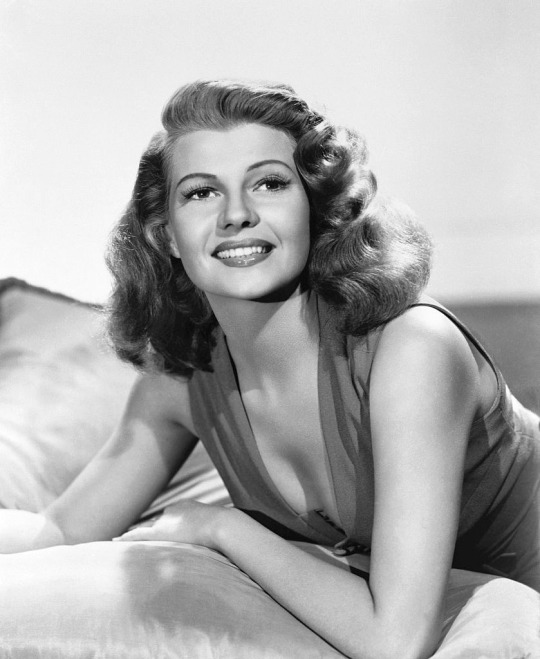
Do you need any other propaganda? Here’s the video.
youtube
She was not called "the love goddess" for nothing: beautiful, glamorous, despite playing sexy and provocative roles her inherent shyness somehow also would shine through sometimes, creating this contradictory and incredibly attractive image
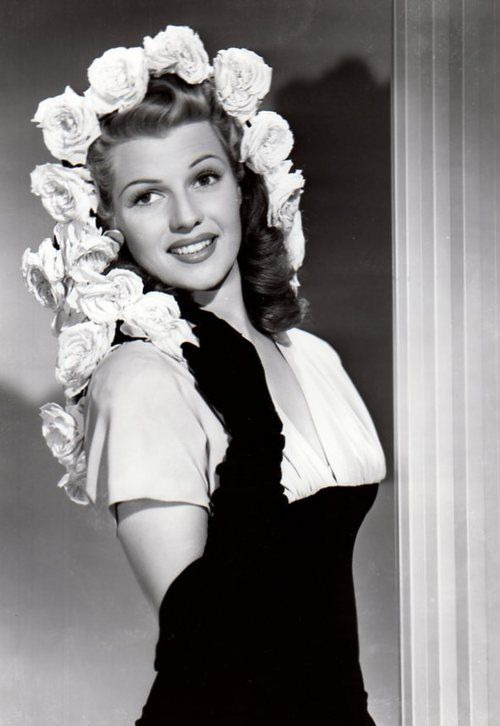


Often played "the bad girl" who tempted the male hero away from "the good girl"; but did have roles that broke her out of that mold. She was also the inspiration for Jessica Rabbit. THE pinup girlie.
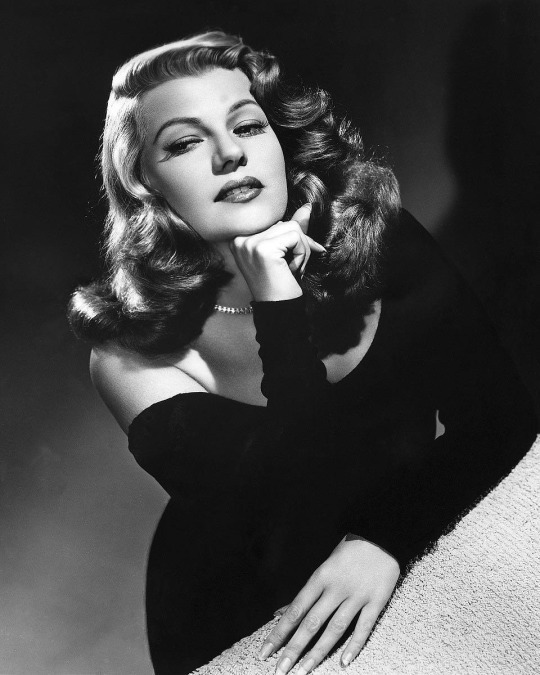
HELP
youtube
She was soo beautiful when she was young and she MAINTAINED that beauty into her later years and I think that old lady glamour is hot. bombastic sex appeal

every line she delivers in gilda is so flirty and passionate or absolutely desolate and it's so good
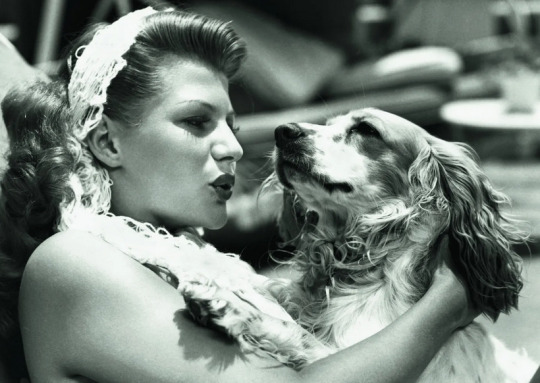

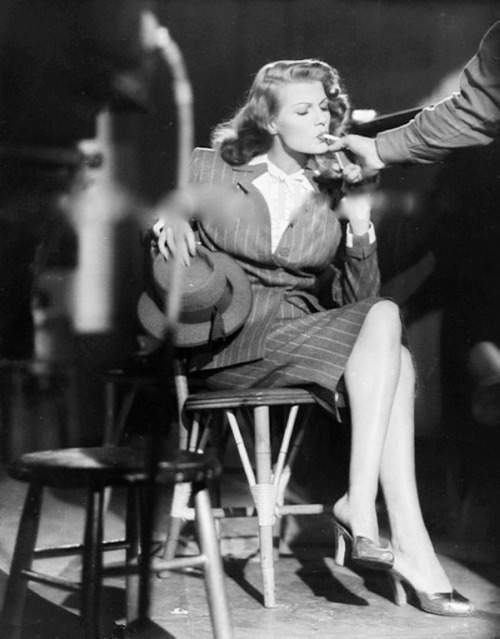
I just have a lot of feelings about her
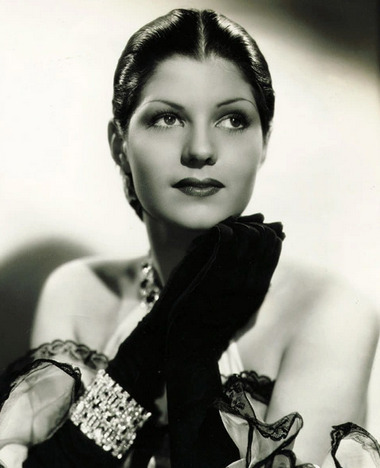
#rita hayworth#nancy kwan#hotvintagepoll#fuck that old woman#ladies 4#me to myself (personally): FUCK.#Youtube
213 notes
·
View notes
Text
it's SO interesting seeing how different people react to the story of mouthwashing and how it unfolds, particularly the element of playing as curly and Jimmy
Having seen both gab smolders and jacksepticeye play it now, it's interesting seeing how differently they react to it all
Gab reacts to it similar to how she reacts to most pov horror games she plays, in that she takes the story in stride and the actions of the characters are accepted and interpreted through a lens of understanding that this is a horror story, and everyone is the worst version of themselves. What surprises her the most is just *how* intense the themes and suffering gets, such as the cannabalism and sheer vitriol Jimmy says to curly, but she's not surprised that Jimmy is awful at all. Even him being the main pov character for majority of the game play doesn't necessarily make any reveals about him (he got Anya pregnant, he was the one who crashed the ship) into a lesser being in her head, she's more intrigued by what they reveal about the story. That's not to say she thinks he's great at all, but any information doesn't take him down from a pedestal in her head because she never had one on him in the first place.
Given she loves horror stories and horror games and frequently talks about the horror books she reads, this makes sense. She's primed to come to a horror story knowing it's a tragedy and no one is good and accepts that immediately.
Jack, on the other hand, interprets the lenses of Jimmy as the inherent main character, and he is, but jack takes it as, 'he is the victim the story is happening to' rather than 'he is as much complacent and active in the horrors going on as the story wants to make him experience.' he gives Jimmy a normal voice when reading out his dialogue, and everyone else gets some kind of voice acting - a deviation from the norm, which is immediately Jimmy in his eyes. Even curly gets a rough scratchy voice and through that until jack sees his face, it can inferred jack sees him as the grizzled old man that Jimmy arguably is instead of curly (tho in the wake of most people seeing curly as nothing but a victim and incapable of causing any harm when he very much did, this is kind of refreshing to me).
It's only when Swansea is dead and Jimmy is REALLY descending into madness, that jack considers the idea that Jimmy may be the bad guy, and that in turn, he has been perpetuating many actions that have led to the horrible situation getting worse.
Interestingly, the puzzle - gab, who up until that point has been thoroughly horrified by everything that does happen and how graphic the game has been, seems to find a sort of dissociative comfort in making the pipes line up so curly can digest his own leg. Meanwhile jack cannot stop focusing on the horror of making curly digest his own leg to the point that he takes a while to figure out how the puzzle works to complete it, and eventually settles into a very uncomfortable silence as he makes it work.
It's two really interesting ways that this game has been interpreted and I kinda fucking love thinking about it.
102 notes
·
View notes
Note
Sorry to bother you,
Your blog is wonderful! Since it's one of the most dialogue/explanation oriented, i wondered if i may please come to you with a more general doubt. i'm sincerely confused... Why is "curing" disability bad per se?
So far, the arguments (on Tumblr) seem to be,
i. Consent.
ii. Generalisation. ("Everyone will want this same thing".)
iii. The undercurrent ideology holding disability as a flaw to be "cured" (including the use of the term "cure").
On which we all agree, they're implicitly bad no matter if it's disability or a haircut. Very well.
But.
What of magical healing per se is inherently bad? Because being given a choice implies that for every given person agreeing, there are going to be others who won't. So we should still write our fantastical society around them, that's not in any way in question.
But these, the possibility of magical treatment and the non-necessity of the same, are not mutually exclusive. You don't have to "take one before the other", they can very well coexist.
Last question (i promise), is seeking treatment for oneself bad?
Like, if there came up a quest to get the glittering flower blooming once a millennia guarded by the Evil Dragon of Evil and capable of magically taking away OCD and PTSD, sign me up! Or if there's a spell to resuscitate my thyroid or an alchemical pill that solves ADHD's executive dysfunction. i mean, that's kind of what my medications should do if they weren't so costly and inaccessible, and that would be a one-time thing too.
Autism's doing alright, i'd keep everything, thanks.
Disclaimer, i'm obviously not advocating for eugenetics (as this term has been often used and misused in these discussions, better to precise).
All these conditions in one way or another define me and effect my life in a pervasive, quotidian way, or/and on a more existential scale. Not always in bad ways -my life is not a tragedy, and this i wish to make clear. i'm not saying that a "magic cure" should come before a change in society to accommodate disability. What i'm advocating for is their coexistence, as a choice -not evil per se, but nocive if inserted in a context of ableism, negation of individual consent, and, indeed, choice.
Or at least that was what i was arguing for until a few months ago. Now however, seeing as the collective opinion is one of strong rejection for these ideas, i believe there must be some important fallacies in my reasoning, and i wish, before everything else, to correct them. To understand.
Sorry for the monologue, but, may you help me?
Thank you for your time and for your kindness,
Anonymous Sloth.
Thank you for your ask! The reason curing disability is bad in media is because the disabilities cured often cannot be cured in real life. People with incurable disabilities already have so little representation, taking away the characters they see themselves in with an impossible cure is incredibly disheartening. I live with multiple incurable physical conditions, and I’ve accepted that I’ll live with them for the rest of my life. Day to day I already deal with people saying how much better my life would be if I didn’t have these conditions I had no choice in getting, I don’t want to see that in my stories! If someone has my conditions I don’t want the author to get rid of them with magic, I want to see that character going on cool adventures and being badass! Sure a magical cure might be nice, but that’s never going to happen. I’m going to be living in this body for the rest of my life, and I want to see stories where people like me get to live their lives with their conditions!
Disabled people should be allowed to see themselves in sci-fi and fantasy stories! People who can’t be cured, who can only have their symptoms managed, who have to be on medication/assistive devices the rest of their lives and who don’t want to be cured should be allowed to see themselves in media without the constant reminder that most able bodied people think their lives would be so much better is they would simply stop being disabled.
Additionally, even conditions that do have cures or ways to manage them aren’t realistically portrayed. There are never any symptoms, side effects or rehabilitation, it’s always portrayed as a magical cure that completely gets rid of the disability. This rarely happens in real life, and I don’t think it’s wrong for someone who shares a condition with a character to want to see that condition accurately portrayed.
It’s perfectly fine for a disabled person in media to want to seek treatment, plenty of disabled people in the real world also have to fight to get treatment (though the fighting is usually against insurance and doctors, not dragons and wizards). But like I said above, it should be at least somewhat realistic. The world is already over saturated with stories of people getting magical cures that make everything better forever, but what about cures with long lasting or permanent side effect? What about healing that requires extensive physical therapy? Or someone who needs to take potions for the rest of their lives to manage their condition? These realities should also be portrayed. Sure maybe some people want to see an escapist fantasy where their conditions could get cured, but not everyone wants that and it’s almost entirely done by abled authors who fathom why anyone would want to see a disabled person who isn’t trying to ‘overcome’ their disability.
We’ve also reblogged this post & answered this ask that deal with similar topics if you want to check them out.
I hope this helps! Have a nice day,
Mod Rot
-
Everything Mod Rot said.
Basically, it's like giving us representation and then taking it away. Readers with that disability are going to read that book and relate to that character. Having a character like you in a work can be so important. But then the character is magically cured of an incurable condition, and now they're completely abled. Good for them. But the reader is still disabled. The reader will still always be disabled.
Disabled representation is already so rare. It's not really nice to take away what little we have.
- Mod Aaron
Echoing what everyone else has said, I want to add an extra thing:
If there was a wealth of disabled characters in media, represented with respect and nuance and care and all that, some stories involving disability being cured wouldn’t feel out of place, because there would already be so much to see that it would be an interesting departure and not posed as the only option for a happy ending.
And if you’re writing something about curing a disability that you have because that’s your experience and it’s what you want, that would make sense as well.
But since so many representations of disability in media have the underlying message that the only way to truly be happy or worthy or whatever with a disability is to have it cured, to have the least amount of signs of disabilities ever, then adding more of the same to that can be not just frustrating but harmful.
An “overcoming” of disability, a “making invisible” of a visible disability, or a cure for a disability are not the only stories worth telling about disabled people—because they are also not the only lives worth living for disabled people.
— mod sparrow
134 notes
·
View notes
Text
ableism in mha
okay so i was scrolling and i came across this post and it helped me reorganize a lot of thoughts ive been thinking sense i first started mha. ive always been not a fan of izuku getting ofa in the first place as it felt to me as it almost completely erased any meaning of his backstory. it felt like such a plot armor/mary sue moment but in the end i got over it, assuming that most likely he would loose it at one point (i was right but we'll get to that later).
after he enters UA its almost as if his entire past is just like- not important?? i have plenty of hcs about his suppressed trauma and if you read into a lot of the situations he goes thru in the manga i can see it but is not blatantly said/expressed that he struggles with a complex from how he was treated as a child.
in the end mha becomes a manga mostly focused on some sort of version of not judging a person by their cover. The fact that a technically "villainous" quirk does not make someone a bad person.
now ofc this is totally true. no one should be overlooked or declined rights or decency because of the quirk they have. this lesson is a valid one.
the analogy i have made up in my head is this.
people who are born with "hero-like" or "useful" quirks, for example: bakugou, todoroki, hawks etc are beautiful people
(for the context of this metaphor ignore the fact that beauty is complex and is in the eye of the beholder just roll with me)
and then you have the people with "useless" or average quirks that are just average people
and then you have people like toga or shinsou with quirks that are seen as inherently dangerous. quirks that are unable to be used for good. those are the ugly people.
now obviously we shouldnt discriminate people just because society says they are ugly. there is no doubt in that and it is a tragedy that it happened and still happens.
however
20% of the population cannot even fall onto this scale. the quirkless. aka the disabled. they are not even seen as being worth a label on the scale because they are so disgusting and strange that no one wants to remember yhey exist.
i wouldnt be as upset by the lack of talk about quirkless people if izuku wasnt quirkless, if the first arc of mha wasnt izuku struggling with the fact that no one in the world cares about him but his mom and that not even her believes he can achieve anything because of his disability.
the whole set up was izuku wanted to be a hero DESPITE his disability. even though truly he thought it was impossible. he didnt work out, he didnt try and do anything to become a hero because he believed everyone was right. that what society had been telling him his whole life was true and he couldnt be a hero. but he wanted to despite that. that was the hook of mha. at least for me.
a bullied lonely boy with a disability achieves his dream despite society. despite being told at every turn that he couldnt do it. he said he can and he does.
but thats not what happened at all.
instead some pillar of all that is heroic drops down from the sky and magically cures his disability. and suddenly hes just a normal kid.
and suddenly we forget all about midoriya izuku and how hard it is to be quirkless. how much quirkless people struggle. how many of them must commit suicide because of yhe seeming completely normalized harassment of them in everyday life.
and i dont want to blame izuku for this because in the end hes a kid with trauma who just wants to fit in. its frankly quite obvious that he whole heartedly agrees with bakugou and everyone else from his past that yeah quirkless people are useless.
the way he treated Melissa in the movie broke my heart. he belittled her like it was second nature and while he obviously had no malicious feelings toward her because of her quirklessness he sees her as a second class citizen. hes surprised that she is able to achieve things despite her disability. that she manages to be happy in a world where she isnt "normal".
and again in the long run i dont truly blame izuku for feeling this way. like everyone he is a product of his environment.
again, however:
i do blame horikoshi
do we need to be nicer to people with villainous quirks: yes ofc
but your manga isnt about that. your manga is about someone whose seen as even less than that. you can address both issues.
having bakugou break down about izuku becoming quirkless was good but that was pretty much all we got.
and what happenes when izuku looses ofa?? he gives up on being a hero.
how the hell does that make sense
everyone in japan knows this boys name. he is considered a top hero. and he just drops off the face the hero scene?
hatsume exists??? izukus face has been in her boobs TWICE for gods sake. yaoyorozu can make things out of thin and are they had to wait 8 years.
izuku is too smart to not think of that.
it would take hatsume 3 days max.
and ignoring that whole point again hori is pushing the idea that bakugou and everyone from aldera were CORRECT. that yeah u were right to think the quirkless of useless cause like they cant do anything :3c
izuku has had NO growth this whole manga. all hes learned is how to hit things how to kick things and awww kacchan sad :(((.
nothing about believing in himself. nothing about how he can be a hero despite the odds. nothing even about the power of friendship helping him to overcome.
im just like wtf hori.
#bnha#boku no hero academia#mha#my hero academia#izuku midoryia#midorya#critical#negative#tw ableism#ableism#quirkless midoriya izuku#mha 430#bnha 430#mha manga#bnha manga#mha spoilers#bnha spoilers#bnha manga spoilers#mha manga spoilers
79 notes
·
View notes
Note
If it's alright, can I ask why you like the Golden Deer house more than the Blue Lions or Black Eagle houses? Like, what caught your eye about them over everyone else?
So I actually got into FE3H through a friend of mine, @dar-draws, who I already knew through mutual good taste (Dickkory), and fanarts like this one, this one, and this one plus the way she talked about Claude and Claudeleth caught my attention. I watched a couple playthroughs of the Golden Deer route on YouTube and absolutely fell in love (before finally getting a switch just to play it myself, for which I was violently bullied here). So like, I was already going into the game biased, which is part of why when I got it I went ahead and played through Golden Deer before doing all the other routes in turn; it was genuinely important to me to personally see all sides of the story. But even as I've played the other routes and replayed SS and AM and gained even more of an appreciation for them, I'm still always sort of drawn back to VW and the Deer.
I think it's ultimately vibes-based, but I'll try to articulate it. I'm not really a big fan of "cozy" sorts of games—I've played and enjoyed ACNH, but the things I most enjoyed about that game were finding things to do and goals to complete, like completing the main quest line or filling up the museum. So it's not so much that I find the Golden Deer to be cozy so much as adventurous. They're not inherently personally invested in the conflicts of White Clouds (they don't know Lord Lonato or Miklan, and their house leader isn't [gestures generally]), but they're also not just ping-ponging through the story. They go through the same events as the other two houses, but they're coming at it from more of an outsider's perspective, and their choice to get involved and react and respond feels more active.
The Deer also don't have any real reason to follow Claude, either, and in the early game they make sure he knows it; none of them are really all that concerned that they're speaking to the future Grand Duke of their country. Lysithea snaps at him, Leonie shoots the breeze with him, Raphael is jovial with him, Lorenz undercuts him, Hilda is blase with him, Marianne tries not to talk to him, and Ignatz gets into theological debates with him. Over the course of the game, they develop the same loyalty to Claude that the other house members already have for their leaders almost by default, and it feels a lot more earned because we see it happen. And that in turn makes scenes like the one at Myrddin, where Claude reveals his true goal of opening the border with Almyra and embracing foreign cultures and the other Deer are surprised but trust Claude and follow his lead, that much more satisfying.
I was a little surprised, when I played through the other three routes, that aside from the designated talking-with-the-cast scenes every route gets, the characters who aren't house leaders or retainers don't really have all that much to do in the story. On Verdant Wind, you pretty consistently have members of the Golden Deer appearing in other cutscenes and giving their two cents; there's even a unique scene where Lysithea realizes there's something up with the Empire's mages because of her backstory and approaches Claude and Byleth about it. It's nothing too obtrusive—they do still have to accommodate the potential for character death—but it's those small details that make a difference to me. Every house has a particular dynamic with odd silly quirks, but the Deer being just that little bit more integrated into the story really helps sell the idea that they belong here and they're making this story their own.
There's also the matter of where specifically their adventure takes them. I respect the choice to focus on Dimitri in Azure Moon, because it does handle his character and arc very well and I think also does the other Lions justice (with the exception of Dedue), but it's also focused largely on Dimitri's personal arc and the Tragedy of Duscur and doesn't really follow through on a lot of the events of White Clouds. (Which some Blue Lions stans have been okay with because they think the Agarthans are bad villains, which...that's valid, but stories still have to like, address plot elements they set up.) Verdant Wind, by contrast, does actually pull back and try to figure out the real impetus behind the whole conflict, and it ends with them beginning to properly lay Fodlan's true problems to rest.
So while the route isn't flawless and I do think there are issues with how characters are written that are part of larger trends within the game and the series as a whole, there's a very specific kind of fantasy adventure energy with the Golden Deer that I enjoy. I think the stories I'm most drawn to are the ones that keep their eyes on a specific goal but still make you feel like the characters would bring that same energy to goofing around with each other, and I think that's something Verdant Wind does very well.
#fe3h#golden deer#fe3h meta#asks#that reminds me i should really replay cindered shadows idk why i haven't#also reminds me. dar followed up that post a year later bc we both got a 3ds to play awakening to romance chrom#the ground is level at the foot of the cross
41 notes
·
View notes
Text
hmm nienor’s amnesia as a parallel to the false freedom of captives allowed to walk out of angband... by letting her forget, glaurung temporarily severed her ties to her cursed family— but it’s no liberation, just a step towards a more horrific re-tying of her familial ties.
this is something that really interests me in CoH because the bad things that happen are showing how morgoth sees the world, right? the special curse in answer to hurin’s profession of faith is that this one family WILL enact morgoth’s vision of them. like when eru 3d painted the song of the ainur but worse and only one nuclear family. i digress. but i mean, often it’s as if you could imagine the demonic gaze fade in over the scene playing: saeros unknowingly quotes morgoth’s opinion on human women; turin punishes saeros in a morgoth-approved way (it’s 3am im not opening the can of worms that is the “orc-work/play” thing). it’s tolkien at his most catholic.
so like here’s this heroic pagan tragedy a la tolkien, and of course it isn’t meant to be a reconstruction, he intends to climb it to look out upon the sea. (hurin receives a catholic spoiler to throw in morgoth’s face, tuor is there in the origo as a literal easter egg). also, and this is my entire point im trying to talk about, it’s incredibly good family horror too! especially when it comes to the women who can’t do anything else besides bearing the curse. morwen doesn’t even meet glaurung. nobody thinks she needs to. nobody thinks glaurung needs to. she is the mother of the children of hurin and he is the father of dragons and idk maybe nienor and her unknowing is sort of an insulator between them. and what’s interesting to me is that tolkien is so brilliant at painting the inherent and inescapable horror of family, but clearly intends it to be viewed in the context that the horror isn’t inherent, because, again, catholic. if it seems bad then you are looking at it through morgoth’s eyes, or looking at one that was marred by morgoth! and nienor was not in the grave, because the water never gave her body back. but nienor’s name was on the grave, because the ones who buried her brother carved it there, and because the sea wouldn’t touch tol morwen
#coh#i remain committed to posting coh thoughts in the middle of the night that are incoherent and hostilely formatted <3 help.#i shouldn’t post this should i. non mutuals don’t try me
55 notes
·
View notes
Text
2024 vid recs
Under the cut, recs for vids I saw last year that were published in 2024. Since it's already January I am cutting myself off and making a list from things I've already seen and loved but inevitably there is so much more out there and I would love to see recs from everyone else! Fandoms include dungeon meshi, wheel of time, the general concept of time loops, several miscellaneous cdramas, and other random stuff I personally like
Dungeon Meshi
what are the rules for breakfast today by @dykealloy - anime only action heavy ensemble vid that's just full of energy and a bop!
MONSTER and OTHER SIDE OF PARADISE by @mynnthia - two super short manga vids about Falin (but I'm pretty sure that this is manga from before where the anime cuts off rn if you're avoiding manga spoilers but not the manga in general) - this does SUCH cool animation with the lyrics and the manga panels the movement is so dynamic and well matched with the song and fun to watch
Eat It by @allegoriestamvs - this is exactly what it sounds like, a goofy fun vid about food in the dungeon meshi anime, which much like the show itself packs in more characterization than you'd expect given the silliness
Kiss Me Dungeon Lord by @sevenangrybees - manga vid that is full of delicious delicious spoilers don't watch this if you haven't finished the manga. But if you have the parallels!!! The original post for this vid has been sitting in my drafts for ages because I Needed to rewatch it (I still need to rewatch it there's a lot in there)
Wheel of Time
best friend by @thiswildernessismyhome - Moraine&Lan vid that is just a real bop. Friendship!!! Really fun movement to watch in a fighting as dancing kind of way! Also some incredible anachronistic lyric matches
put on a show by stardust_rain - another bop! but about Lanfear so it's a more evil bop :D some really fun stuttery editing that gives it a real groove
What's Up by cosmic_llin - Moraine character study - I do think of this song as kind of a meme song but it's taken VERY seriously in this vid and it's perfect for Moraine - it does make me sad about her
Velodrome by stardust_rain - aes sedai focused. This really leans into how beautiful this show is, lots of gorgeous visual parallels and also another one that makes me sad about how aes sedai are very constricted despite being very powerful
Time Loops
Okay so this time loops section is one multi-fandom vid and several Reset vids but whatever, I love time loops
Do What You Want by cupidsbow - this is SUCH a cool multi-time-loop vid - it really gets into the nihilism inherent in time loops
And Do It Again by @rhea314 - Reset - a bop! This combines extremely fun boppy music (and fun boppy movement editing) with dying repeatedly which is the kind of incongruity I love
one wrong turn by @marquisguyun - Reset - this one you probably are better off having watched the show for because it really leans into the parallels with everyone on the bus' story and how one moment can lead to death in a time loop
Everything Else :p
queer cinema - pink pony club by @finalgirlguy This pulled in SO much queer cinema, much of which I haven't seen (and now want to), but even without knowing all the source it's a real testament to queer joy and so fun to watch
Trust+Fall by @sandalwoodbox (fandom: Romeo+Juliet) I was not expecting to be sad about Romeo and Juliet, like the characters not the whole play. We all know how this one ends and they're just dumb teens or whatever but ugh this vid was SO upsetting (positive, love to be sad about a tragedy)
Hell or High Water by dkwilliams (fandom: Word of Honor) This vid takes the plot of WoH seriously and draws a ton of beautiful thematic parallels and turns it into a more coherent arc than the show imo. This made me sad about, well, you know the dead people, but also everyone in the jianghu.
Thunder City by @bingeling (fandom: DMBJ: Reboot) Really beautiful aesthetic vid leaning into creepy tomb stuff with a ton of silence and diegetic audio. This is one of those vids that is so impressive to me on a technical what you can do with the medium level (and also just really cool to watch), would highly recommend with/without fandom knowledge. To do the equivalent of a bookstore readalike, fans of the older multi-dmbj show vid Aspara Calling may enjoy this (and vice versa)
Joyride by @himemeiya (fandom: utena movie) extremely fun, very short, sometimes you gotta lean into wtf is the utena movie
this Nirvana in Fire vid by @zhoudadudugongjin I love NiF vids that are goofy but also saying something real about the show. In this case that real thing is MCS will break your heart :D
Boys in the Ocean by @rhea314 (fandom: Fire Island) I'm bookending these miscellaneous recs with queer joy. This vid just made me grin the whole time - it captures all the fun goofy moments and also all the cute moments of this movie and also is a bop!
Also going to put a blanket rec for the four festivids for Bound (including mine!) here - they were all really beautiful and extremely sexy (do mind the tags)
FYI I've decided to leave out the vampires (specifically ones being interviewed, though I also haven't included any snowfall or fangs of fortune vids here) - I haven't seen the source material and while I have seen several rad vids, I feel unprepared to give recs based on the random things that have crossed my radar. But there's a lot of cool vids out there, if you like iwtv definitely go looking for vids
#reclist#vids#one of these days I should do a more thematic list of older vids but given that my new years recs have really slipped we'll see...#and with all of this I feel like I don't have a huge breadth of knowledge#but you know that is what bullying other people into also making rec posts is for#I hope people like getting tagged in rec posts I think last year I mostly linked to ao3 instead....#as always I feel like this got super long...#happy new year it's still kinda sorta on time right....
25 notes
·
View notes
Text
NOT A SHIP!
Heres smth my mind cooked up at like 2am last night...
Grr i wanna make a post about how error an ink are like two sides of the same coin but how when presented with empathy and a grander existence one accepted with open arms while the other was shattered buy it
One the creators voices were something like a kinship to be encouraged while the other was treated like entertainment someone to get reactions from
They both live in a void type world but it really shows the difference between their personalities and their mental states
One has not enough emotion while the other has far too much of it
They were both broken by the greater multiverse
Yet they were forced back together (errors whole body being completely unstable)(ink not having a soul)
Error may view aus the way he does because in his mind they actively hurt him or somehing
While ink vidws aus the way he does cause aus actively keep him alive
Something else is they both basically have no recollection of the tragedy that created them..
They're both neutrals in the multiverse, sure error may seem like hes inherently evil but i see it more of him having a pessimistic view of aus while ink has an optimistic view of them (and we ALL know how bad some aus can be if youre in the fandom)
Error is isolation while ink is community in a sense
People forget that they arent just one personality- theyre both pretty complex once you look past the surface
28 notes
·
View notes